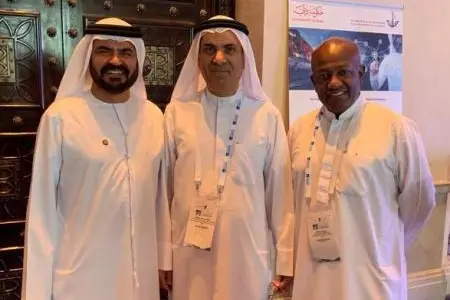PHOTO
EMAC to present the Dubai Maritime Law Conference in collaboration with The City Law School (CLS), City, University of London on 25th September
Dubai, UAE: To continue its commitment in providing excellence in maritime alternative dispute resolution and facilitating meaningful dialogues with key industry stakeholders, the Emirates Maritime Arbitration Centre (EMAC) is playing an integral part in the UAE Maritime Week 2019, starting with participation at the Dubai Maritime Summit on 22nd September, 2019 followed by participation at the Seatrade Offshore Marine & Workboats and Shiptech Middle East Conferences.
As part of the week, EMAC will engage with commercial, legal, offshore energy, and insurance stakeholders by speaking at and sponsoring the second edition of the Dubai Marine Insurance Conference (DMIC), on the Queen Elizabeth 2 on 24th September, 2019.
“We started our journey three years ago with the intent of providing excellence in arbitration and mediation for the maritime sector. We have set out to make a viable contribution in the industry to establish EMAC as a preferred seat for maritime arbitration in the region,” said Mr. Majid Obaid Bin Bashir, Chairman and Secretary General, EMAC.
“We would like to take this opportunity and thank our audiences and colleagues for creating platforms where all stakeholders can come together to express their views and learn from each other. EMAC remains committed to serve the industry and grow engagement with all stakeholders,” he added.
EMAC will follow the insurance discussions by working with The City Law School (CLS), City, University of London, at the Dubai Maritime Law Conference on 25th September, 2019, at the DIFC Conference Centre, providing a further opportunity to gain valuable insights into the emerging challenges and developments in international maritime law in the region and globally.
Professor Jason Chuah, Professor of Commercial and Maritime Law and Head of Department, The City Law School, said: “The City Law School takes pride in its illustrious history of providing quality maritime legal education and training. To respond to the growing demand for specialised legal services in the UAE, a leading maritime hub in the region, The City Law School introduced last year an LLM Maritime Law, the first postgraduate qualification of its kind in the Gulf.
“Our participation in regional industry events is a valuable opportunity to hear a range of fascinating perspectives from thought leaders in the shipping industry and beyond. We are therefore excited to partner with EMAC in holding this important conference in the UAE.”
‘Navigating Changes and Challenges in global and regional shipping’, as a conference headline gathered law professionals, industry specialists and commercial experts to share know how and intelligence about the shipping sector, specific to the region.
EMAC’s next sponsored event will take place in Abu Dhabi during the week of ADIPEC in November. For more information visit: www.emac.org.ae/events
About Emirates Maritime Arbitration Centre (EMAC):
Emirates Maritime Arbitration Centre (EMAC) was established in accordance with Emiri decree No. 14/2016 by His Highness Sheikh Mohammed bin Rashid Al Maktoum, Vice President and Prime Minister of the United Arab Emirates and Ruler of Dubai, in April 2016, with a formal launch of its services in November of the same year. Initially based out of Dubai International Financial Centre (DIFC), EMAC has its own legal identity and is financially and administratively independent.
EMAC was launched in response to the region’s growing maritime activity, the UAE’s ambitions to develop into the world’s largest maritime hub in the world by 2025, and the belief in the efficiency of the arbitration process. The first specialised maritime arbitration centre to be established in the MENA region, EMAC aims to position the UAE as a centre of excellence for maritime arbitration, adhering to best practice in line with international standards.
Impartial and transparent, EMAC works with organisations across the region, providing services for resolving maritime disputes - through arbitration, mediation and other dispute resolution processes. EMAC’s rules are built on the most up to date internationally recognised arbitration and mediation rules - they allow for emergency arbitration and fast-track arbitration, to meet market demand and address the sector’s need for fast and efficient dispute resolution.
By establishing a trusted global standard for maritime arbitration services in the UAE, EMAC aims to continue to promote awareness of local, regional and international dispute resolution best practices, and to further support the UAE as it develops into a world-renowned maritime destination.
© Press Release 2019
Disclaimer: The contents of this press release was provided from an external third party provider. This website is not responsible for, and does not control, such external content. This content is provided on an “as is” and “as available” basis and has not been edited in any way. Neither this website nor our affiliates guarantee the accuracy of or endorse the views or opinions expressed in this press release.
The press release is provided for informational purposes only. The content does not provide tax, legal or investment advice or opinion regarding the suitability, value or profitability of any particular security, portfolio or investment strategy. Neither this website nor our affiliates shall be liable for any errors or inaccuracies in the content, or for any actions taken by you in reliance thereon. You expressly agree that your use of the information within this article is at your sole risk.
To the fullest extent permitted by applicable law, this website, its parent company, its subsidiaries, its affiliates and the respective shareholders, directors, officers, employees, agents, advertisers, content providers and licensors will not be liable (jointly or severally) to you for any direct, indirect, consequential, special, incidental, punitive or exemplary damages, including without limitation, lost profits, lost savings and lost revenues, whether in negligence, tort, contract or any other theory of liability, even if the parties have been advised of the possibility or could have foreseen any such damages.




















